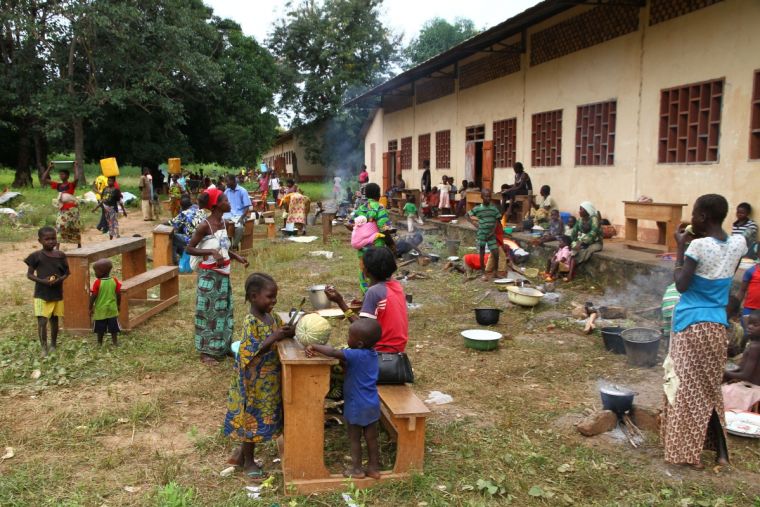Pray for the Central African Republic

Central African Republic is French-speaking and its population is around 76 per cent Christian. On Sunday 24 March 2013, Seleka - a coalition of local and foreign Arabic-speaking Islamic militias - seized control of the capital, Bangui, in an orgy of violence and looting.
But Seleka does not rape, loot and kill indiscriminately. Rather, Seleka attacks Christians and spares Muslims, causing traditional community trust to evaporate, and creating a sectarian tinderbox.
Rebel commander and self-appointed president Michel Djotodia, a former CAR diplomat who was radicalised in Sudan, admits that he does not know who all the fighters are because some are escaped criminals and most do not follow his orders. "It is hard for me to control them," says Djotodia, who maintains strong ties to Khartoum, Sudan.
After months of terror, an organised armed response is emerging out of the mostly Christian communities of northern CAR. Most villages have long had defence militias that protect residents from bandits. Known as anti-balaka (literally anti-machete) these groups, now large and angry, are out to avenge Seleka crimes. Armed with home-made weapons and adorned with colourful fetishes and occult charms, these anti-balaka militias have begun attacking not just Seleka, but local Muslims. Seleka might be responsible for turning CAR into a sectarian tinderbox, but by attacking local Muslims - just because they are Muslims - the anti-balaka militias are lighting the fire.
North of Bangui, in the Ouham prefecture, some 170,000 people have been displaced. Peter Bouckaert, the emergencies director at Human Rights Watch, spent early November travelling the region with photographer Marcus Bleasdale. Bouckaert writes: "In the early morning of 6 September, anti-balaka forces working with military elements loyal to [ousted president] Bozizé carried out a series of brutal surprise and near-simultaneous attacks on Seleka bases and Muslim communities in several villages around Bossangoa, killing dozens. Muslim males, regardless of age, faced death."
The BBC reports that on 9 September, Moustapha Mohamed's father, a village chief in nearby Bouce, was killed by a 'Christian' militia that was attacking local Muslims. Mohamed praises his Christian neighbours who alerted many Muslims that armed groups were coming after them. However, later the same day, Muslims organised reprisal attacks against Christians. By the time the violence had finished, at least 14 were dead (including three Muslims) and some 485 homes had been burnt. Aukin Nountabaye, a priest in the Bouca diocese, narrowly escaped when Muslims stormed his church. He fled Bouca, walking for four days to reach Bangui.
Bouckaert wrote in early November that it is possible to drive for hours around Bossangoa, Ouham's capital, without seeing anybody, on roads that are littered with bundles of belongings dropped by those fleeing for their lives. In the bush the displaced people are stalked by infection and malaria, enemies just as merciless as Seleka. "Those who have made it to Bossangoa," writes Bouckaert, "live in desperate conditions: Every structure and inch of space around the town's Catholic church -- its seminary, guest house, school, library, storage rooms, soccer pitch, and the surrounding fields - have been taken over by displaced people, all Christians."
On 25 October the UNHCR put the number sheltering in the Catholic Mission at 37,000. A further 2,700 are sheltering in the hospital and 728 Muslims are holed-up in a local school. Around 1,000 Muslim ethnic Fula have been occupying the airstrip without access to shelter, clean water, food and sanitation.
UNICEF goodwill ambassador, Mia Farrow, recently returned from a week-long visit to CAR warning, "The seeds are present for a genocide."
Bouckaert said similarly, "The anti-balaka's attacks have triggered brutal reprisals by Seleka fighters against Christian communities. This heinous cycle of inter-religious violence only continues to intensify, threatening to explode into an all-out war between Christians and Muslims."
UN Secretary-General's Special Adviser for the Prevention of Genocide, Adama Dieng, on 1 November warned that, if there is no intervention "this will end with Christian communities, Muslim communities killing each other . . . I will not exclude the possibility of a genocide occurring."
Please pray specifically that God will:
- refine his Church, preserving the faithful and supplying their needs; may the Church grow in faith, solidarity, grace and numbers as people seek the Lord for peace and the healing of their land.
'Some trust in chariots and some in horses [i.e. military might],but we trust in the name of the LORD our God' (Psalm 20:7 ESV) - intervene to end the dangerous cycle of sectarian violence; may he rais e up and empower peace-makers able to influence the anti-balaka militias to focus on defence and refrain from attacking local Muslims.'Blessed are the peacemakers, for they shall be called sons of God.' (Matthew 5:9 ESV)
In Psalm 10:14a we are told that the Lord sees and notes 'mischief and vexation', not as a mere observer, but for a purpose: 'that you may take it into your hands' (ESV), or 'to requite it with thy hand' (KJV). So. . .
'Break the arm [means of action, supply lines and the like] of the wicked and evildoer [local and international fighters and inciters]; call his wickedness to account till you find none.' (Psalm 10:15 ESV)











